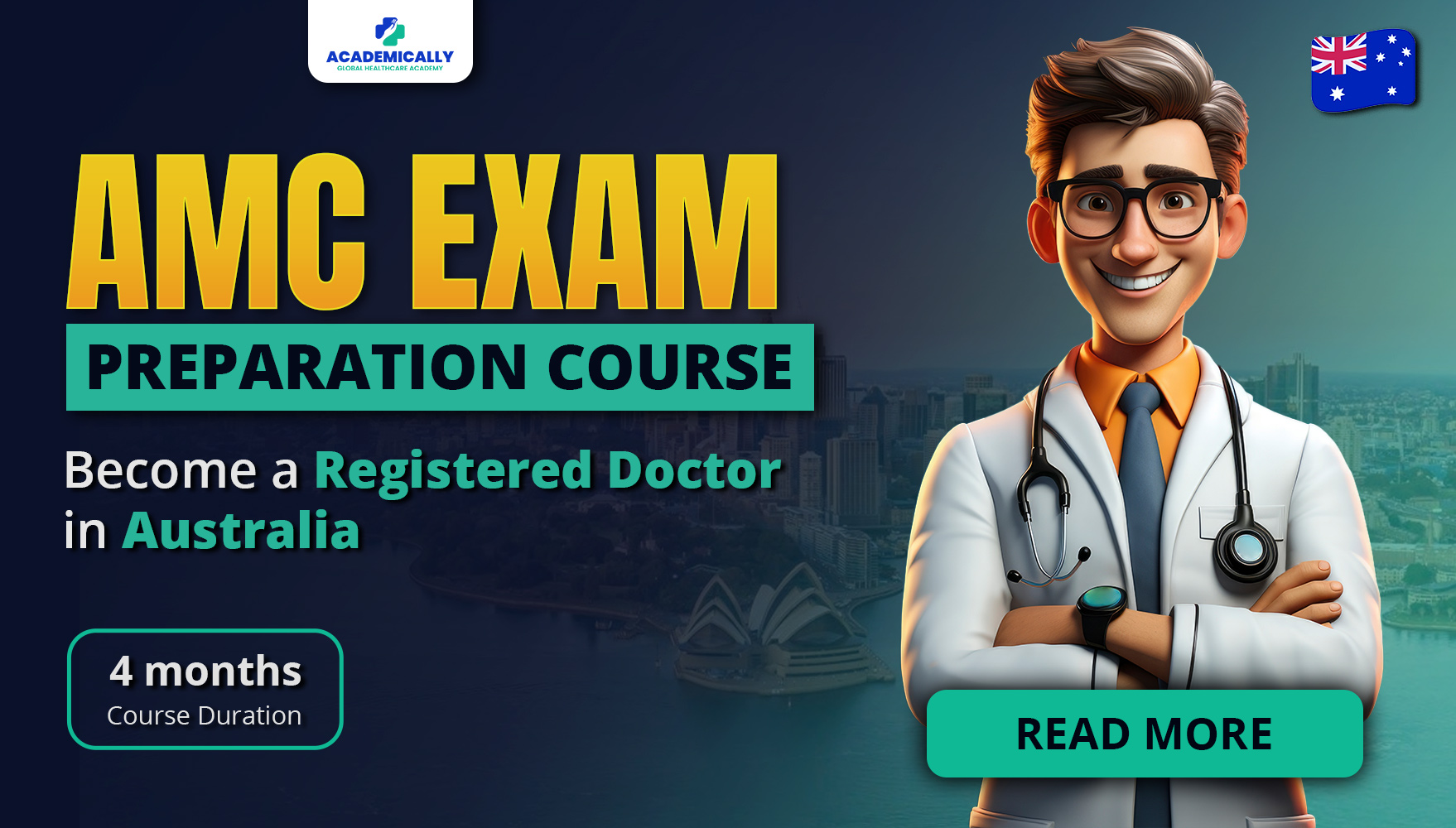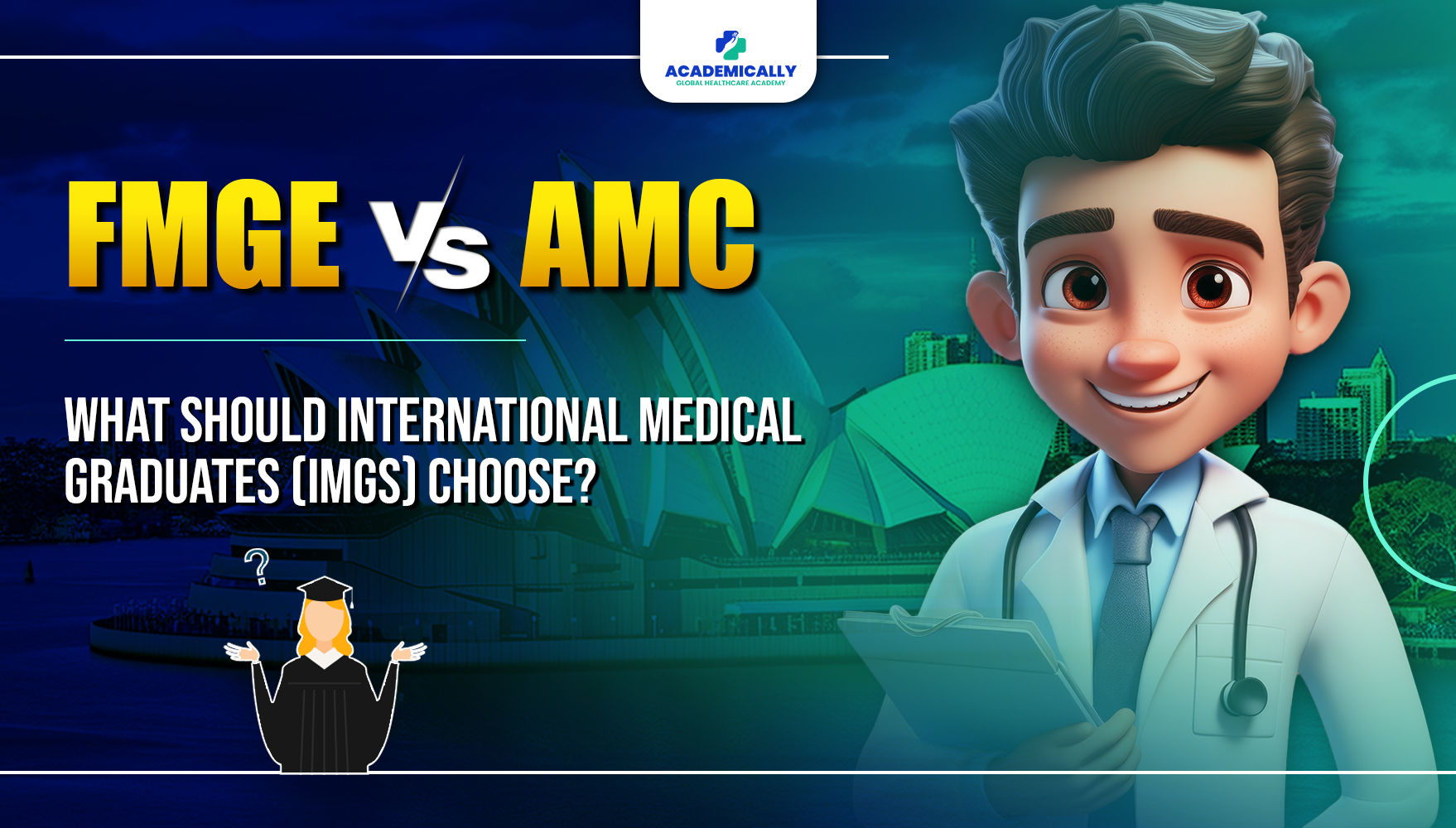FMGE (Foreign Medical Graduate Examination)
AMC (Australian Medical Council) Exams
Eligibility
FMGE
To be eligible to take the FMGE, candidates must meet the following criteria:
- Citizenship: Candidates must be either citizens of India or overseas citizens of India.
- Primary Medical Qualification: Candidates must hold a primary medical qualification that is recognized by the Indian embassy as valid for enrollment as a medical practitioner in the country where the institution granting the qualification is located.
- Passing Qualification: It is essential for candidates to provide proof of passing the primary medical qualification on or before the specified cutoff date.
AMC
For AMC, the candidate must have:
- A medical degree such as MBBS/MD/MS at a medical university recognised by the Australian Medical Council (4.5 years).
Exam Format
While FMGE is a single-step exam conducted in India, AMC is a two-step examination. AMC 1 is a computer-based test, and AMC 2 is a practical examination.
Both FMGE and AMC aim to assess candidates' comprehensive understanding of medical knowledge and proficiency in clinical skills.
| Categories | FMGE | AMC 1 | AMC 2 |
| Exam Mode | Computer-based | Computer-based | At the examination centre in Melbourne or online |
| Question Type | Multiple Choice Questions | Multiple Choice Questions | Clinical Examination |
| Duration of the Exam | 5 hours | 3 hours 30 mins | 8 hours |
| Number of Questions | 300 | 150 | 16-stations |
| Total Marks | 300 | 500 | Score of 10 or more of the 14 assessed stations marks as pass |
| Marking Scheme | 1 mark for each correct answer and no negative marking | Measurement of the candidate’s ability level | Global rating on a seven-point scale |
| Total Number of Attempts | 6 attempts in 3 years | No limit | No limit |
| Syllabus | All 19 subjects from the MBBS curriculum | Based on the undergraduate medical syllabus | Based on the undergraduate medical syllabus |
Key Factors To Consider
Here are some key factors to consider for international medical graduates when deciding between FMGE and AMC exams:
Career Goals
Consider your long-term career aspirations and where you envision practising medicine. If your goal is to work in India, FMGE is the appropriate pathway. Conversely, if you aim to practise in Australia, pursuing the AMC pathway is advisable.
Eligibility and Recognition
Evaluate whether your medical qualification is recognised by the respective country's medical regulatory authorities. Ensure that you meet the eligibility criteria for the chosen exam, including citizenship requirements and recognition of your primary medical qualification.
Preparation Resources
Assess the availability of preparation resources, such as study materials, coaching programs, and practice exams, for the chosen exam. Adequate preparation is essential for success, so ensure that you have access to the necessary resources to prepare effectively.
Cost and Time Investment
Calculate the financial costs and time required to prepare for and take the exam, including potential travel expenses if applicable. Consider factors such as exam fees, study materials, coaching costs, and the cost of living in the country where you plan to practise.
Global Recognition
Evaluate the global recognition of the exam you choose. While FMGE primarily enables practice in India, AMC exams are widely recognised internationally, facilitating licensure and practice in multiple countries beyond Australia.
Scope of Practice
Consider the scope of practice allowed by each pathway. FMGE restricts practice to India, limiting international career opportunities compared to exams with broader recognition, such as the AMC pathway.
Language Proficiency
If English is not your first language, consider the language proficiency requirements for each exam. Both FMGE and AMC exams may require candidates to demonstrate proficiency in English language skills through exams like IELTS or OET.
Quality of Healthcare System
Evaluate the quality of the healthcare system and clinical exposure offered by each country. Practising in Australia, for example, offers exposure to a high-quality healthcare system with diverse patient populations and advanced medical facilities.
Validity of Exam Results
Consider the validity period of exam results. FMGE scores are valid for a lifetime once passed, while AMC exam results may have a limited validity period, necessitating periodic revalidation of qualifications.
Personal Preferences
Lastly, consider your personal preferences, such as cultural fit, lifestyle, and professional networks, when deciding between FMGE and AMC exams. Choose the pathway that aligns best with your individual circumstances and goals..
Pros and Cons
FMGE (Foreign Medical Graduate Examination)
Pros:
- Straightforward Eligibility: The eligibility criteria for FMGE are relatively simple, requiring candidates to be Indian citizens or overseas citizens of India with a recognized medical qualification.
- Lifetime Validity: Once passed, FMGE scores are valid indefinitely, providing flexibility in the timing of licensure.
- Familiarity with Indian Healthcare System: For candidates intending to practice in India, FMGE offers familiarity with the Indian healthcare system and patient population.
Cons:
- High Competition: FMGE is highly competitive, with a significant number of candidates vying for limited residency positions and job opportunities.
- Limited Scope: FMGE restricts practice to India, limiting international career opportunities compared to exams with broader recognition.
AMC (Australian Medical Council) Exams
Pros:
- Global Recognition: AMC exams are widely recognized internationally, facilitating licensure and practice in multiple countries beyond Australia.
- Comprehensive Assessment: The AMC exams assess not only medical knowledge but also clinical skills and language proficiency, ensuring well-rounded competency.
- High-Quality Healthcare System: Practising in Australia offers exposure to a high-quality healthcare system with diverse patient populations and advanced medical facilities.
Cons:
- Complex Eligibility: Eligibility requirements for AMC exams can be more stringent, requiring additional assessments such as English language proficiency exams.
- Limited Validity: AMC exam results may have a limited validity period, necessitating periodic revalidation of qualifications.
- Cost of Living: Australia's high cost of living, including expenses for housing, healthcare, and education, can pose financial challenges for international medical graduates.
Final Words
Both FMGE and AMC exams serve as critical gateways for international medical graduates seeking to practise medicine in India and Australia, respectively.
Understanding the similarities and differences between these exams is essential for aspiring medical professionals to navigate the complex process of international medical licensure and registration effectively.
Whether aiming for FMGE or AMC, thorough preparation and adherence to eligibility requirements are crucial for success in these examinations and subsequent medical practice in the desired country.
If you are thinking of Australia, join Academically today! Academically offers an exclusive course called the AMC Preparation Course to ace the AMC exam on the first attempt.

Fill up this form for a free one on one counselling session.



